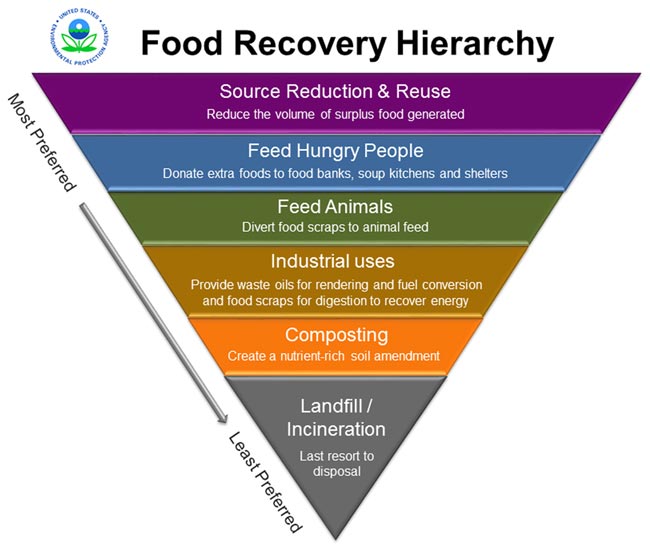Food waste prevention and reduction

Identify ways to prevent and reduce food waste
Now that you have identified where, how much, and why food is wasted at your business through the waste and site assessments, you can take steps to prevent and reduce waste. The best way to address the issue of food waste is to prevent it by not creating it in the first place. In addition to the assessments, tracking wasted food can reveal opportunities to streamline purchasing decisions to meet actual demand, thus avoiding unnecessary waste. These efficiencies can save your business time and money. Examples of efficiencies include:
- revising purchasing policies to avoid routinely over-purchasing certain items
- implementing a “just-in-time purchasing” system
- creating a “first-in, first-out” system that uses older products first
- improving storage practices to ensure that food is stored under the proper conditions for maximum shelf life
- reducing batch sizes to avoid leftovers
- serving smaller portions.
In addition to some of the above practices, the EPA website external link and the resources below provide further information on best practices for preventing and reducing wasted food in your business.
Resources for preventing and reducing food waste
There are resources available to help your business save time and money and protect the environment through preventing and reducing wasted food. For unavoidable food waste, see our resource pages for donating edible food to hunger relief organizations or processing food scraps into valuable products like compost or energy.
The following resources offer services to monitor food waste and design food waste prevention and reduction practices for your business. (All links external).
- Cascadia Consulting Group
Service provided: Cascadia supports businesses in all aspects of food waste reduction, from auditing waste streams, identifying opportunities to develop effective waste reduction strategies and providing hands-on technical assistance. Over the past 20 years they have helped thousands of local businesses improve their waste reduction, recycling, and resource conservation practices.
Applicable to: Companies of all types and sizes, from neighborhood restaurants to multinational Fortune 500 companies. See the Cascadia Consulting Group website for more information.
Contact information: Stephanie Thomas, stephanie@cascadiaconsulting.com, (206) 449-1149 - Full Circle Environmental
Service provided: Full Circle Environmental is a full-service, resource conservation consulting firm, specializing in business assistance, offering audit services, outreach and education support. Since 1993 they have helped thousands of businesses – including restaurants, grocery stores and corporate cafeterias – to prevent food waste, divert compostables and recyclables from the waste stream, conserve energy and water, and address climate change.
Applicable to: Businesses of all sizes, non-profits, academic institutions, and local, state, federal and tribal governments. See the Full Circle Environmental website for more information.
Contact information: David Stitzhal, stitzhal@fullcircleenvironmental.com, 206-723-0528 - LeanPath
Service provided: Lean Path provides food waste tracking systems to foodservice operators to help them cut food waste, increase their bottom line, and benefit the environment.
Applicable to: Food service operators of all sizes (e.g. colleges/universities, hospitals, restaurants, large offices. Case studies may be found on the LeanPath website
Contact information: Janet Haugan, info@leanpath.com, 877-620-6512 x2 - United States Environmental Protection Agency
Service provided: EPA partners with organizations and businesses to prevent and reduce wasted food. Food Recovery Challenge (FRC) participants save money, help their communities, and protect the environment by reducing wasted food through prevention, donation, composting, and anaerobic digestion. Tools and resources are available via the FRC website and participants benefit from technical assistance, peer networking, and national recognition. For more information, visit the United States Environmental Protection Agency website.
Applicable to: Any business or organization can join the FRC, either as a participant or an endorser. Participants in Washington State include colleges and universities, grocers, sports and entertainment venues, and hotels. Food Recovery Challenge endorsers include Cedar Grove Composting and the Washington Department of Ecology.
Contact information: Domenic Calabro, Calabro.domenic@epa.gov, 206-553-6640 - Wilder Environmental Consulting
Service provided: Wilder Environmental Consulting implements and evaluates city programs and provides education, outreach, program implementation and waste auditing services. See the Wilder Environmental Consulting website for more information.
Applicable to: Multifamily residences, businesses and schools.
Contact information: Sam Wilder, swilder@wilderenvironmental.com, 206-949-1787
NOTE: King County maintains this resource list as a courtesy to the public and does not endorse or guarantee the quality of the service offered or provided. If your business or organization offers waste prevention, reduction, rescue or recycling services and would like to be listed on this website, please contact Karen May at Karen.may@kingcounty.gov.


 Translate
Translate
